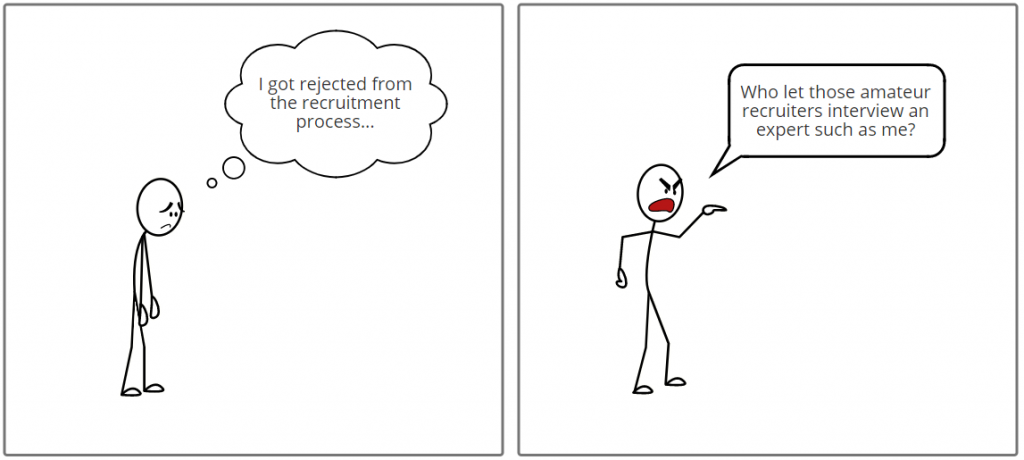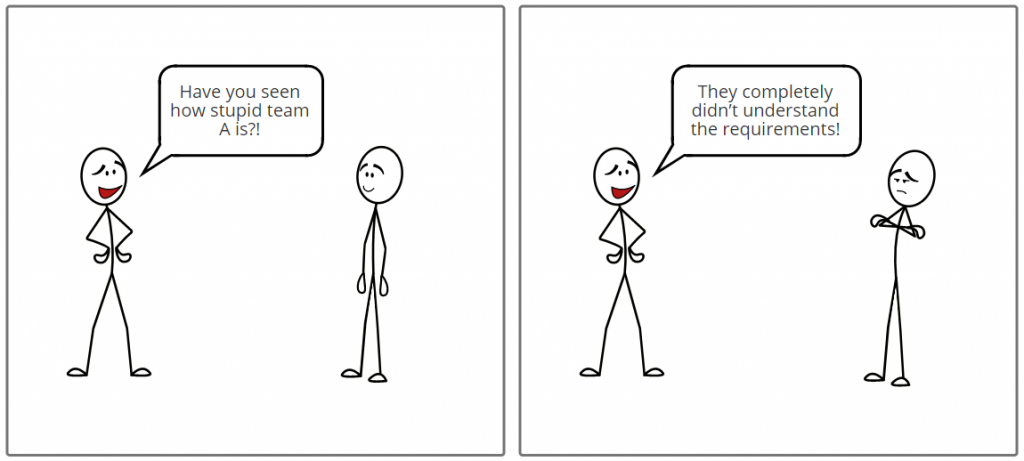
Although we’d like to think we’re always rational and accurate in our attributions, we tend to distort certain situations to make ourselves feel better. It’s pleasurable to paint yourself in a positive light and it’s pretty hard to admit to a mistake. Especially when your reputation or, dare I say, your salary, is on the line. And here it comes. The self-serving bias in all its glory.
It’s not me, it’s you
It starts from the very beginning of your professional career, that is when you first look for a job. You send in a resume, you get invited to an interview and finally you give your very best to get the job. If you get hired, you’ll attribute it to personal factors, your exceptional skills and meaningful experience. But if they don’t make you an offer, you’ll blame it on some external factors. You’ll say it’s because they’re short-sighted and incompetent, so you wouldn’t want to work for them now, even if they begged to hire you!

You’ll start asking questions like: “Who let those amateur recruiters interview an expert such as me?”. Ladies and gentlemen, that’s a perfect example of a self-serving bias. One study [1] describes it perfectly as a:
“(…) tendency to attribute our successes to ourselves, and our failures to others and the situation.”
When you take credit for success and blame failure on external causes, you may be the victim of a self-serving bias. But why should you even care about that?
It turns you into a toxic person
You can imagine that working with people who are more interested in taking credit for success and avoiding responsibility for failure can be a challenge. You may even say it’s a nightmare. If you haven’t worked with that type of people before, you will definitely recognize them from various sitcoms and movies. Their behavior and attitude can affect an entire team, negatively of course.
A self-serving person is not going to respond well to criticism. You can put in a great deal of effort to creating constructive criticism and delivering it in the best possible manner, but it will still be rejected. People affected by that bias can only see their own strengths. They tend to boast about their skills and tremendous experience while deprecating others.

That tendency often turns them into toxic people. Complaining and offending others are their favorite activities. They easily become a pain the neck within any group since their behavior creates unnecessary tension and negative atmosphere.
It gets even worse when it affects group leaders
A self-serving bias is definitely harmful when it is exhibited by a team member. But it’s even more destructive when it affects a manager or a leader. Imagine a manager who is unwilling to face the reality. He’s complaining about a team and their low-quality results while grabbing all the glory for himself when they succeed. It’s not only a matter of poor collaboration with the manager, but it exposes the whole team to a lot of project- and people-related risks.
I love that scene from the Horrible Bosses movie in which all the employees await a huge announcement about who gets to be promoted and who gets the bigger office. And then the boss, played by Kevin Spacey, looks around and with a smile on his face, he says:
“He’s right here in this room, it’s me (…) I’ve realized if you want to get something done right, you gotta do it yourself”.
The fish rots from the head. Self-serving leaders erode trust and bring down the morale of a team. It’s hard to imagine people speaking honestly when their boss is blaming them for every bad thing that happens. According to another study [2], the blame culture prevents people from learning and decreases the quality of their performance. What is more, pointing fingers will spread easily from one person to another. And that will make the situation even worse.
Cultural differences
People from Western countries are more affected by self-serving bias than people who come from East Asia. The reason for the existence of that bias is actually similar across the globe. We all want to maintain and enhance our self-esteem. As yet another study describes [3], we want to be seen as good people:
“(…) individuals desire to be viewed as appropriate, good, and significant in their own culture.”
But the difference in how various cultures are affected by self-serving bias lies in the understanding of the word “good”. Being “appropriate and good” means different things in different cultures. That’s why the exposition to the problem and the scale of it are not the same across different cultures. In some countries, we pay more attention to self-enhancement because that makes us feel better.
Western countries
In highly individualistic countries, like those in North America, a good person is defined as the one who can take care of him-/herself. You need to be talented, competent and successful in the areas you’re focused on [4]. In this case, perfection is achieved when you are simply the best and you do not show your weaknesses. Only then can you feel accomplished and have quite high self-esteem.
Eastern countries
On the other hand, the same bias is less apparent among people who come from East Asian countries, which are more collectivistic than individualistic [1]. In hierarchical East Asia, being a good person is tied to maintaining one’s face and fulfilling one’s role.
“Success in such cultures comes not so much from individuals’ beliefs that they are good but by having significant others believe that they are meeting the consensual standards associated with their roles.”
Moreover, people from East Asia and the Western world vary in the way they perceive their competence and weakness. Recognizing a weakness in someone of Asian descent doesn’t necessarily constitute a big problem for that person. It doesn’t evoke negative feelings as it does in case of Westerners [5]. Asians live in an environment which is oriented towards constant improvement. That’s why they don’t need to lie to themselves and resort to self-enhancement. They don’t assume they’re already perfect.
Conclusion
You might have noticed victims of a self-serving bias in your workplace. You might have even been one of them. The only way to minimize the impact of that bias is to raise your awareness on the subject. The more you read and the better informed you are, the more likely you’ll be to stop self-enhancing. And that will definitely affect the way you behave at work and the way you treat others.
Accept that you’re not perfect and be accountable of your actions, both the good and the bad. Even if you see that others are totally infected with a self-serving bias, don’t act like them. And since you’ve read all about it, you no longer have an excuse to act this way!
References
[1] Mezulis, A. H., Abramson, L. Y., Hyde, J. S., & Hankin, B. L. (2004). Is There a Universal Positivity Bias in Attributions? A Meta-Analytic Review of Individual, Developmental, and Cultural Differences in the Self-Serving Attributional Bias. Psychological Bulletin, 130(5), 711–747. 10.1037/0033-2909.130.5.711.
[2] Fast, Nathanael & Tiedens, Larissa. (2010). Blame contagion: The automatic transmission of self-serving attributions. Journal of Experimental Social Psychology. 46. 97-106. 10.1016/j.jesp.2009.10.007.
[3] Heine, Steven & Hamamura, Takeshi. (2007). In Search of East Asian Self-Enhancement. Personality and social psychology review : an official journal of the Society for Personality and Social Psychology, Inc. 11. 4-27. 10.1177/1088868306294587.
[4] Crocker, Jennifer & Park, Lora. (2004). The Costly Pursuit of Self-Esteem.. Psychological bulletin. 130. 392-414. 10.1037/0033-2909.130.3.392.
[5] Heine, Steven & Lehman, Darrin & Ide, Eugene & Leung, Cecilia & Kitayama, Shinobu & Takata, Toshitake & Matsumoto, Hisaya. (2001). Divergent Consequences of Success and Failure in Japan and North America: An Investigation of Self-Improving Motivations and Malleable Selves. Journal of personality and social psychology. 81. 599-615. 10.1037/0022-3514.81.4.599.